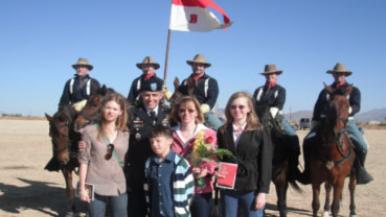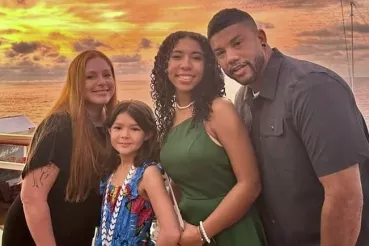Our mission at the Road Home Program at Rush is to treat veterans and service members who struggle with the invisible wounds of post-traumatic stress, military sexual trauma and traumatic brain injury. During the past year, I’ve witnessed Rush’s response to the pandemic and marveled at the dedication and professionalism of the entire Rush community. As a proud Chicagoan, veteran, husband and father, I am honored to serve at such a genuinely caring, prestigious and compassionate institution.
I served for 28 years, 26 on active duty and two years with the Illinois National Guard. During the summer of 2011, my wife, our three kids and dog departed Fort Huachuca, Arizona, and began our cross-country journey to Chicago to begin post-service life. My family served alongside and supported me during my long Army career, and now we were about to embark on the next chapter in life together. We were excited and anxious because of the many unknowns of where the next chapter would bring us. Our military life was full of unknowns, but this was a huge step, returning to the private sector (aka, civilian world). The reality was, the next step would take us from the safety and security of our gated military community to a place somewhere in northern Illinois.
Our story is no different than the thousands of military families and service members who separate and transition from service every year. Amazingly, 2021 marks our 10-year anniversary of retirement from the Army. During the past decade, we’ve had our struggles, but we've also experienced both personal and professional growth and become more resilient. Our transition from Arizona to Illinois was, to say the least, an eye-opening experience. I am extremely proud of my family and feel it’s time to share our story. My hope is this essay helps our fellow citizens understand their unique opportunity and role supporting veterans and their families reintegrate into their communities.
Finding footing as a civilian
During my career, we were fortunate to live on a military installation; the Army refers to them as posts. I describe life on a post as comparable to living in a gated community, albeit with all the municipal services and resources of a small town. As anticipated, we experienced a culture shock as we settled into our new home in Illinois. There was no commissary, Post Exchange, gate guards, military neighbors, chapel or leadership to support and motivate us. Our military community was gone.
As you can imagine, this was a very busy time, locating and setting up the house, enrolling kids in school and, most important, finding employment. My wife was a stay-at-home mom during my career (What a trouper — hardest job on the planet in my humble opinion) and bore the brunt of unpacking boxes as we settled in our new home. She struggled with the disconnection from our military community and identity during this time. She was an Army spouse living in a non-military community. It was nobody’s fault, but our neighbors could not really relate to or understand our situation. Make no mistake, the community was wonderful: outstanding folks, good schools, services and quality of life that was comparable to our home in Arizona, but it was difficult to feel connected to the community. After a couple of months, we began engaging with our community starting at the nearby public library. It’s always one of our first stops upon arriving in a new community.
We officially retired on Aug. 31, 2011. I was no longer a soldier, but a private citizen focused on seeking employment, paying the bills and feeding my family. This also meant I was unemployed for the first time in my life. Thankfully, we planned, and had savings and my retirement pay to get us by for a couple of months. But the pressure was on. I landed a job after four uncomfortable months and have worked steadily since, thank goodness. My post-service work has been in higher education and training, specifically working with veterans, service members and their families. I also engaged in the local community and work to decrease the civilian-to-military divide. My energy is focused on educating our citizenry about service to country and civic responsibility, and, of course, increasing understanding of the veteran/military community. I am thankful to have found my niche doing meaningful work.
Community connections year-round help ease reintegration
You are probably wondering why I share these personal experiences with you. Because I believe moving forward, the veteran and military community should be part of the post COVID-19 recovery in our communities. Longtime negative depictions of veterans are troublesome, and these stigmas/stereotypes can affect how they reintegrate into their communities. Sadly, too many Americans perceive veterans as “damaged heroes,” which compounds the disconnection between civilians and service members.
Veterans are often portrayed as objects in need of charity and pity rather than as potential leaders, coworkers, peers and friends. Our communities and fellow citizens now have an opportunity to change this narrative. Veterans are thankful for the “Thank you for your service” gestures, but now it’s time to take the next step and a call to action.
Communities and local organizations are major players during the reintegration process. The local village/city hall should be a focal point for welcoming and connecting transitioning service members and families to resources. Also keep in mind, veterans may range in age from 22 to 60 years old. Imagine being 24 years old, having your whole life ahead of you and being called a “veteran.” I initially struggled and felt uncomfortable being called a veteran, and I’m middle-aged. It will take time, effort and persistence for veterans to feel comfortable with their new title, identity and place in the world.
Veterans are our neighbors, friends, family members, etc. — just regular people trying to make it through the day. The sooner a veteran is reintegrated and contributing to their community, the better. Let’s find a way to engage with veterans throughout the year and tap into their skills and experiences to improve our communities — not just on the obligatory holidays. Too often veterans who separate from service are referred to as “damaged.” Yes, many struggle, but who wouldn’t during a significant life event? The fact is, most veterans assimilate into their communities, without fanfare, and become contributing members of society. The majority of veterans only need a hand up, rather than a handout.
Veterans add value to communities beyond active service
What values, skills and experiences do veterans and service members bring to our communities? First off, we are volunteers who took an oath to support and defend the U.S. Constitution. We willingly serve our country, and this desire to serve does not end when we separate from service. The desire for continued service should be capitalized on by local communities. What a wonderful opportunity to connect with veterans and learn from and about them. Many veterans, currently serving service members and their families have experienced long periods of separation and isolation while participating in training exercises, deployments (stateside and overseas), etc. They also faced many dangerous situations and unknowns. Family members worried: Will my loved one be killed or return safely?
Does this sound familiar having gone through the past pandemic year? Veterans have specialized training in first aid, security, support and stability operations, etc. Many have faced danger and understand how to react to chaotic situations with discipline and restraint. We can and want to help others live in peace and enjoy post-service life. We understand and live the concepts of duty, selfless service and teamwork because everyone has to “carry their weight” while on mission. It’s time to start sharing and carrying the load together.
Lastly, I encourage all veterans to be proud of your service, whether in peace or during wartime. You served your country and made a difference. It takes time to find meaning and purpose post-service; take it one day at a time. Take ownership of your mental and physical wellness, and seek care when needed. Keep moving forward, one step at a time. Post-service success can be achieved but will take time, effort and support. I encourage veterans to join an organization. Our communities need us. I am a proud member of team Rush and look forward to supporting my community in the future.
There’s work to do.




